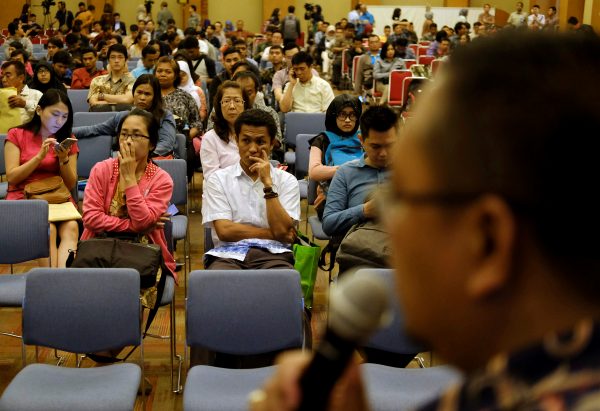What does the Indonesian government need to do to raise the revenues needed to chart a path to economic recovery from the pandemic?
The answer, as the World Bank argued, lies in taking advantage of a window of opportunity to collect more taxes from the expanding middle class. The number of individual taxpayers in Indonesia was around 38.7 million in 2019, more than doubling since 2009. Of these the majority were wage earners; only 20 per cent were self-employed. Despite recent progress in enlarging the tax base, the Indonesian government still needs to focus on reform of two aspects of the tax system to get more of the middle class to pay their fair share: tax policy and tax administration.
On the policy side, the overhauled tax system contained in the Harmonised Tax Law, passed by the parliament in October 2021, is a crucial step forward. The law has a focus on progressivity, raising the income threshold for the bottom 5 per cent tax bracket from Rp 50 million (US$3500) to Rp 60 million (US$4200) annually while raising the rate on incomes above Rp 5 billion (US$350,000) from 30 per cent to 35 per cent.
Businesses with annual sales turnovers of less than Rp 500 million (US$35,000) will be exempt from paying income taxes and employers will face a new fringe benefits tax. New compliance measures include a temporary program for taxpayers to disclose their unreported assets, and linking individuals’ tax accounts to their identity card numbers, replacing the existing tax file number system.
The Indonesian government is currently working hard to formulate corresponding regulations to give the law’s provisions legal effect by early 2022. To ensure that its tax reforms work, the government should keep in mind that optimal tax revenue collection is based on two pillars: institutional capacity and external factors tax experts call the ‘operating context’. This means that in addition to improving its institutional capacity, tax authorities need to understand how tax administration is shaped by the specific socio-economic, political and organisational context in which it occurs.
The current policy reforms have to generate the impression that the new system is fairer. In Indonesia, as in many other countries, the taxation system provides privileges to wealthy people who earn income from assets — and which generally has a lower effective tax rate than the normal rate of business income. This perceived unfairness could prevent those in the middle class from entering the tax base. It is positive that Indonesia has now taken a bold step in changing the tax rates and strengthening the administrative elements for revenue collection.
It is well known that external factors such as the health of the economy, trust in government and public perceptions of corruption can greatly affect the effectiveness of tax administration and the behaviour of potential taxpayers. This is particularly relevant in Indonesia — its middle class has been dubbed ‘professional complainers’ by a former finance minister and has high expectations for public services. For this reason, the government needs to take special efforts to identify and take appropriate steps to minimise compliance gaps — in registration, filing, reporting, and paying — caused by these external factors.
Even with a new and fairer tax policy framework, and more public buy-in, there are still residual administration challenges. Ongoing administrative reforms must be able to convert noncompliant taxpayers — intentional or unintentional — to become compliant taxpayers, in a simpler and more efficient way.
One key target group is self-employed taxpayers. In Indonesia, primarily due to their low ‘income visibility’, roughly 44 per cent of surveyed self-employed taxpayers underreported between 50 and 100 per cent of their actual income. The enactment of a new information reporting regime of replacing tax file numbers with identity card numbers for easier tracking has potential not only to facilitate voluntary compliance but also to deter, detect and address noncompliance issues by those in the middle class.
It is worth noting that without wholesale policy reform tax administration reform on its own takes a relatively long time to have effects. In some cases like Bulgaria, Columbia, Georgia and Mexico, the effects of administrative reform can be seen six to ten years after initial implementation. But in Indonesia — where the policy and administrative reforms are being carried out in a parallel effort — it seems reasonable to hope that the government has ample opportunity to perform revenue mobilisation from the middle class and to boost tax revenue collection before Indonesia reinstates its 3-per-cent-of-GDP budget deficit ceiling in 2023.
Arifin Rosid is Senior Tax Officer in the Directorate General of Taxation, Ministry of Finance, Republic of Indonesia, and a Lecturer at the University of Indonesia. The views expressed in this article are those of the author and do not necessarily reflect the official positions or the policy of the affiliated institution where the author serves.


There has not been an increase in middle income group since the pandemic. In fact, it has shrunk to some extent. How can incremental tax be collected from a declining middle income population??